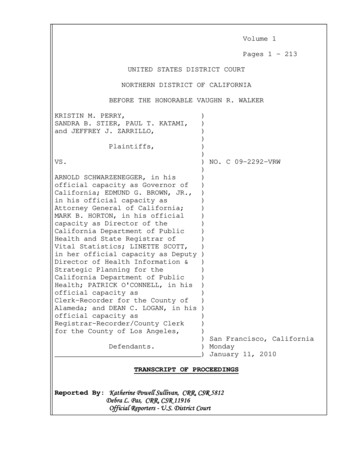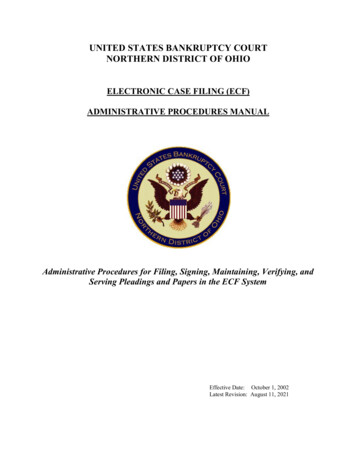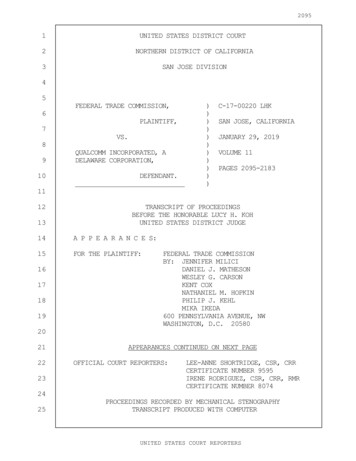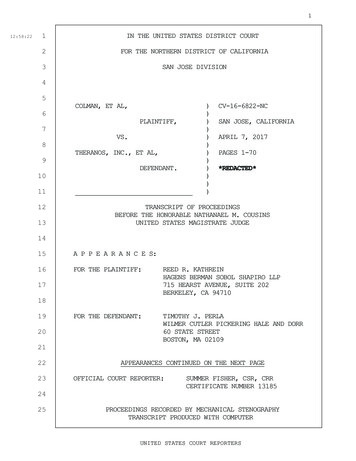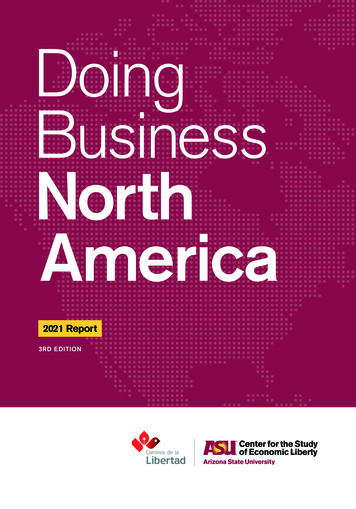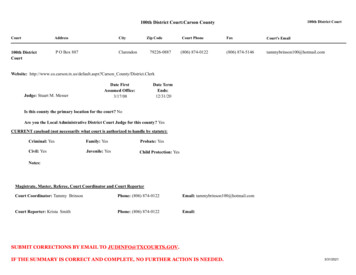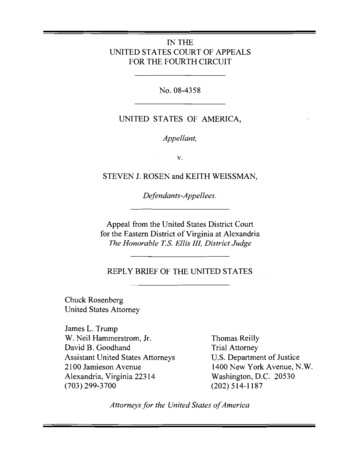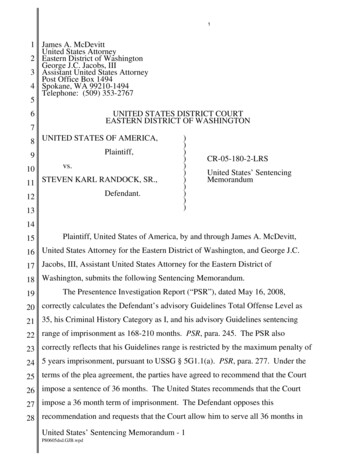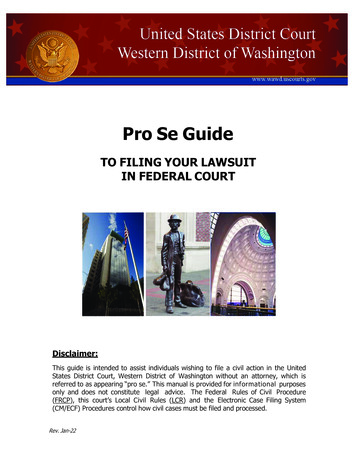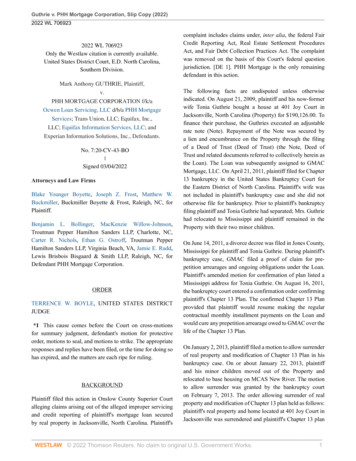
Transcription
Guthrie v. PHH Mortgage Corporation, Slip Copy (2022)2022 WL 7069232022 WL 706923Only the Westlaw citation is currently available.United States District Court, E.D. North Carolina,Southern Division.Mark Anthony GUTHRIE, Plaintiff,v.PHH MORTGAGE CORPORATION f/k/aOcwen Loan Servicing, LLC d/b/a PHH MortgageServices; Trans Union, LLC; Equifax, Inc.,LLC; Equifax Information Services, LLC; andExperian Information Solutions, Inc., Defendants.No. 7:20-CV-43-BO Signed 03/04/2022Attorneys and Law FirmsBlake Younger Boyette, Joseph Z. Frost, Matthew W.Buckmiller, Buckmiller Boyette & Frost, Raleigh, NC, forPlaintiff.Benjamin L. Bollinger, MacKenzie Willow-Johnson,Troutman Pepper Hamilton Sanders LLP, Charlotte, NC,Carter R. Nichols, Ethan G. Ostroff, Troutman PepperHamilton Sanders LLP, Virginia Beach, VA, Jamie E. Rudd,Lewis Brisbois Bisgaard & Smith LLP, Raleigh, NC, forDefendant PHH Mortgage Corporation.ORDERTERRENCE W. BOYLE, UNITED STATES DISTRICTJUDGE*1 This cause comes before the Court on cross-motionsfor summary judgment, defendant's motion for protectiveorder, motions to seal, and motions to strike. The appropriateresponses and replies have been filed, or the time for doing sohas expired, and the matters are each ripe for ruling.BACKGROUNDPlaintiff filed this action in Onslow County Superior Courtalleging claims arising out of the alleged improper servicingand credit reporting of plaintiff's mortgage loan securedby real property in Jacksonville, North Carolina. Plaintiff'scomplaint includes claims under, inter alia, the federal FairCredit Reporting Act, Real Estate Settlement ProceduresAct, and Fair Debt Collection Practices Act. The complaintwas removed on the basis of this Court's federal questionjurisdiction. [DE 1]. PHH Mortgage is the only remainingdefendant in this action.The following facts are undisputed unless otherwiseindicated. On August 21, 2009, plaintiff and his now-formerwife Tonia Guthrie bought a house at 401 Joy Court inJacksonville, North Carolina (Property) for 190,126.00. Tofinance their purchase, the Guthries executed an adjustablerate note (Note). Repayment of the Note was secured bya lien and encumbrance on the Property through the filingof a Deed of Trust (Deed of Trust) (the Note, Deed ofTrust and related documents referred to collectively herein asthe Loan). The Loan was subsequently assigned to GMACMortgage, LLC. On April 21, 2011, plaintiff filed for Chapter13 bankruptcy in the United States Bankruptcy Court forthe Eastern District of North Carolina. Plaintiff's wife wasnot included in plaintiff's bankruptcy case and she did nototherwise file for bankruptcy. Prior to plaintiff's bankruptcyfiling plaintiff and Tonia Guthrie had separated; Mrs. Guthriehad relocated to Mississippi and plaintiff remained in theProperty with their two minor children.On June 14, 2011, a divorce decree was filed in Jones County,Mississippi for plaintiff and Tonia Guthrie. During plaintiff'sbankruptcy case, GMAC filed a proof of claim for prepetition arrearages and ongoing obligations under the Loan.Plaintiff's amended motion for confirmation of plan listed aMississippi address for Tonia Guthrie. On August 16, 2011,the bankruptcy court entered a confirmation order confirmingplaintiff's Chapter 13 Plan. The confirmed Chapter 13 Planprovided that plaintiff would resume making the regularcontractual monthly installment payments on the Loan andwould cure any prepetition arrearage owed to GMAC over thelife of the Chapter 13 Plan.On January 2, 2013, plaintiff filed a motion to allow surrenderof real property and modification of Chapter 13 Plan in hisbankruptcy case. On or about January 22, 2013, plaintiffand his minor children moved out of the Property andrelocated to base housing on MCAS New River. The motionto allow surrender was granted by the bankruptcy courton February 7, 2013. The order allowing surrender of realproperty and modification of Chapter 13 plan held as follows:plaintiff's real property and home located at 401 Joy Court inJacksonville was surrendered and plaintiff's Chapter 13 plan 2022 Thomson Reuters. No claim to original U.S. Government Works.1
Guthrie v. PHH Mortgage Corporation, Slip Copy (2022)2022 WL 706923was modified to provide for twenty-one monthly paymentsof 1,825.00 each followed by thirty-nine monthly paymentsof 825.00 each. [DE 102] Pl. App'x at 28. On February 16,2013, GMAC transferred servicing of the Loan to OcwenLoan Servicing (OLS) and on March 15, 2013, GMAC fileda transfer of its claim in the bankruptcy case to OLS. TheLoan was assigned to OLS on May 13, 2013. OLS andPHH subsequently merged and the servicing of the Loan wastransferred to defendant PHH Mortgage Corporation (PHH ordefendant) on February 1, 2019, and on May 14, 2019, theLoan was assigned to PHH.11Because the transfer of the Loan and its servicingbetween OLS and PHH does not impact the Court'sanalysis, the Court at times identifies these partiesas OLS, PHH, or defendant.*2 On March 25, 2014, OLS sent a letter to plaintiff'sbankruptcy attorney about the property and Loan. The letterindicated that OLS's records reflected that plaintiff was oneof two mortgagers on the account, and so although OLS'srecords reflected plaintiff's intent to surrender his interest inthe property through bankruptcy, OLS would follow normaldefault procedures. See [DE 85 p. 171] Feezer Decl. Ex. I.The letter included a disclaimer regarding bankruptcy whichstated, among other things, that the letter was not an attempt tocollect either a pre-petition, post-petition, or discharged debt;that if the bankruptcy case was still active no action wouldbe taken in willful violation of the automatic bankruptcy stay;and if the borrower had received an order of discharge inbankruptcy any action taken by OLS was for the sole purposeof protecting its lien interest in the underlying mortgagedproperty. Id.The nature and extent of OLS's communications goingforward are the subject of dispute. Plaintiff does not disputethat he alleged to have kept contemporaneous notes of theconversations he had with OLS/PHH Mortgage agents buthe lost or destroyed those notes. Defendant contends that itcontinued to contact the co-borrowers on the Loan, plaintiffand Tonia Guthrie, at the single address it had on record,but plaintiff disputes this, indicating that defendant alsosent letters to other addresses. The parties also dispute thenumber and nature of phone calls that plaintiff received aboutthe Loan. For example, plaintiff contends, and defendantdisputes, that beginning in November 2013 he received oneto three calls from defendant per week and that these callspersisted until January 2016. Defendant contends that when itdid call it attempted to speak with either plaintiff or his formerwife, and if the borrower actually reached was involved inbankruptcy or had received a discharge, defendant would,pursuant to its policies and procedures, inform that personthat the call was for informational purposes and was not anattempt to collect the loan. Plaintiff also called defendantattempting to have collection activities and negative creditreporting stopped. Plaintiff threatened to sue defendant if hereceived more letters.On May 18, 2016, after plaintiff had successfully completedall of the payments required under his Chapter 13 Plan asmodified by the surrender order, a discharge order pursuantto 11 U.S.C. § 1328(a) was entered in plaintiff's bankruptcycase and the bankruptcy case was closed on August 22,2016. No attempt was made through OLS to remove ToniaGuthrie from the Loan and plaintiff's name remained on thetitle to the property while the Loan was serviced by OLS.Defendant continued to send to communications about theLoan to plaintiff and Tonia Guthrie at the address on file, andplaintiff contends letters were sent to other addresses as well.Plaintiff contends that following the discharge and betweenJune 2016 and January 2019 defendant continued to seekpayment on the Loan from plaintiff through periodic monthlymortgage statements, phone calls, and demand letters.Defendant disputes that it was seeking payment from plaintifffor any amounts discharged in bankruptcy, again statingthat it engaged in normal collection effects with respect toTonia Guthrie and that all written correspondence includedconspicuous disclaimers that if the Loan was in activebankruptcy or had been discharged the correspondence wasfor informational purposes only.In June and July 2017, plaintiff received mortgage accountstatements from defendant. Both statements included an“Important notice” which reflected that the communicationwas from a debt collector and that if the debt was in activebankruptcy or had been discharged through bankruptcy thecommunication was provided for informational purposes onlywith regard to defendant's secured lien on the referencedproperty. See [DE 102] Pl. App. at 40, 44.*3 On July 17, 2017, plaintiff called OLS and informed themhe had been denied credit because of OLS's failure to updateits records and that he would sue defendant if it did not updateits records. The parties disagree as to whether additionaltelephone conversations took place between plaintiff anddefendant after June 2017. On September 14, 2018, Onslow 2022 Thomson Reuters. No claim to original U.S. Government Works.2
Guthrie v. PHH Mortgage Corporation, Slip Copy (2022)2022 WL 706923County, where the property is located, was deemed a part ofa natural disaster area as a result of Hurricane Florence.Beginning in 2019, defendant was notified of a credit disputesubmitted by plaintiff to consumer reporting agencies TransUnion and Experian. Plaintiff sought and obtained loans andcredit between 2017 and 2020 and was denied credit threetimes during this period. In 2019, plaintiff was denied amortgage loan by Navy Federal Credit Union and car loansby PNC Bank and Sun Trust Bank. He obtained an auto loanin April 2019 from Ally Financial and a mortgage loan aswell as a personal loan from U.S. Bank in 2020. Plaintiff alsoobtained a car loan from Navy Federal Credit Union in July2020.Plaintiff is a commissioned officer in the United StatesMarine Corps and a trained tiltrotor pilot. As part of hisduties, plaintiff secured and maintained top-secret securityclearance. In November 2019, the Department of DefenseCentral Adjudication Facility sent a request for informationto plaintiff seeking information about the Loan which wasreferenced as delinquent in a Trans Union credit report datedMay 30, 2019. [DE 84-8]. Plaintiff disputes the date that hereceived the request for information, but on January 17, 2020,plaintiff received a “no determination made” adjudicationfor his security clearance eligibility, which had the effectof pausing plaintiff's security clearance. The request forinformation sought a response within thirty days, and aresponse from plaintiff was not sent until January 23, 2020, orsixty-six days after the request for information was sent. Thepause on plaintiff's security clearance was lifted on February5, 2020. Plaintiff was not demoted and was not docked payas a result of the request for information or the nineteenday pause in his security clearance; plaintiff also agrees thathis security clearance would not have been paused had heresponded to the request for information within the timeprovided. Plaintiff was subsequently promoted from the rankof Major to Lieutenant Colonel.Plaintiff was diagnosed with gastroesophageal reflux disease(GERD) in 2006. While deployed to Kuwait from October2016 to April 2017, plaintiff resumed taking medicine totreat the issue and the medicine relieved his symptoms. Thereis no evidence in the record which reflects that a medicalprofessional has opined that plaintiff's GERD is a resultof or was exacerbated by the alleged acts or omissions ofdefendant. Plaintiff did not object to defendant's statementthat he has also never been diagnosed with a physical ormental condition which was experienced by plaintiff as aresult of the alleged acts or omissions of defendant, includinganxiety. However, in his own affidavit, plaintiff indicates thathe is seeing a psychologist who has diagnosed him withgeneralized anxiety disorder and that as a result plaintiff iscurrently ineligible to fly. [DE 102] Pl. App'x at 18; GuthrieAff. ¶ 110. Plaintiff also states that his anxiety has caused himto have high blood pressure, a general feeling of being on edgeand jumpy, to be overly worrisome, and to wake up gaspingfor air. Id. ¶ 109.*4 On or about December 16, 2019, plaintiff, throughcounsel, sent a letter to defendant entitled Qualified WrittenRequest, Notice of Error, Notice of Disputed Informationand Requests for Information pursuant to the Real EstateSettlement Procedures Act and Chapter 45 of the NorthCarolina General Statutes. Defendant received the letter onDecember 23, 2019. Defendant responded to the letter onDecember 24, 2019, in which it acknowledged receipt of theletter and stated it would respond within thirty business days.On December 30, 2019, defendant sent plaintiff a pay-offstatement. Counsel for plaintiff then sent a second letter todefendant, Second Notification that Borrower is Representedby Counsel; Instruction to Cease Communicating Directlywith Borrower in violation of the Fair Debt CollectionPractices Act, 15 U.S.C. § 1692 et seq. On January 16, 2020,plaintiff received another monthly mortgage statement.DISCUSSIONI. Motions to seal.At the outset, the Court DIRECTS the Clerk of Court toUNSEAL the following docket entries: DE 97, 98, 99, 100,101, 102-106. Plaintiff filed these documents as proposedsealed documents, advising defendant to file a motion to sealif it desires the documents to remain under seal. [DE 107].Defendant has not filed such a motion as to these documents,and the Court thus finds no basis on which to maintaintheir sealed status. Accordingly, the Clerk shall unseal thedocuments cited this order so that they are available on thepublic docket.Defendant has filed motions to seal the following specificdocuments or exhibits as they contain confidential financialinformation contained in plaintiff's credit report andconfidential business and proprietary documents: DE 85 &DE 86 & DE 69. In the absence of opposition, and asdefendant has sufficiently demonstrated in its briefing that theprivacy interests in the documents cited outweigh the right 2022 Thomson Reuters. No claim to original U.S. Government Works.3
Guthrie v. PHH Mortgage Corporation, Slip Copy (2022)2022 WL 706923of public access, and defendant has further sought to sealonly specific documents rather than entire memoranda, themotions [DE 76 & 87] are GRANTED. See In re Knight Pub.Co., 743 F.2d 231, 235 (4th Cir. 1984).As provided in the motion at [DE 76], only portions ofExhibit 14 to plaintiff's response to defendant's motion forsummary judgment have been requested to be sealed, despiteplaintiff having filed his memorandum and all exhibits to hismemorandum at DE 76 under seal. The Clerk shall unseal DE69 with the exception of DE 69-14, which shall remain underseal and for which defendant has filed a redacted version atDE 76-2.II. Motion for protective order.The motion for protective order is DENIED AS MOOT inlight of the Court's ruling on summary judgment.III. Motions to strike.Plaintiff's motion to strike portions of defendant's errata sheetis granted.Rule 30(e) of the Federal Rules of Civil Procedure providesthat a deponent is permitted to sign a statement listing anychanges to the form or substance of his deposition and thereasons for making the changes. Fed. R. Civ. P. 30(e)(1). “Achange in ‘form’ would include correcting a typographicalerror or a spelling error. A change in ‘substance’ wouldinclude the substantive correction of a court reporter'stranscription (i.e., the witness answers ‘No,’ but the courtreporter records ‘Yes’). William L. Thorp Revocable Tr. v.Ameritas Inv. Corp., 57 F. Supp. 3d 508, 518 (E.D.N.C. 2014).The Rule “does not permit a party to make changes thatsubstantively contradict or modify [a] sworn deposition.” Id.at 518.The changes identified by plaintiff are more thantypographical or substantive. The Court will thereforeGRANT his motion to strike. [DE 79].*5 Defendant has also filed a motion to strike, seeking tostrike portions of plaintiff's opposing statement of materialfacts that do not comply with Local Civil Rule 56.1(a)(2).The Court has considered the motion in light of the relevantstandard, see, e.g., Morrisroe v. Goldsboro Mill. Co., 884 F.Supp. 192, 194 (E.D.N.C. 1994), and declines to strike thematerial cited by defendant. The Court discerns no prejudicein plaintiff's inclusion of an opposing statement of materialfact in his response to defendant's statement of material facts,in particular because plaintiff has filed his own motion forsummary judgment which he has supported by citing to thesame relevant facts. Defendant's motion [DE 117] is thereforeDENIED.IV. Motions for summary judgment.A motion for summary judgment may not be granted unlessthere are no genuine issues of material fact for trial and themovant is entitled to judgment as a matter of law. Fed. R.Civ. P. 56(a). The moving party bears the initial burden ofdemonstrating the absence of a genuine issue of materialfact. Celotex Corp. v. Catrett, 477 U.S. 317, 323, 106 S.Ct.2548, 91 L.Ed.2d 265 (1986). If that burden has been met,the non-moving party must then come forward and establishthe specific material facts in dispute to survive summaryjudgment. Matsushita Elec. Indus. Co. v. Zenith Radio Corp.,475 U.S. 574, 588, 106 S.Ct. 1348, 89 L.Ed.2d 538 (1986). Indetermining whether a genuine issue of material fact exists fortrial, a trial court views the evidence and the inferences in thelight most favorable to the nonmoving party. Scott v. Harris,550 U.S. 372, 378, 127 S.Ct. 1769, 167 L.Ed.2d 686 (2007).However, “[t]he mere existence of a scintilla of evidence” insupport of the nonmoving party's position is not sufficient todefeat a motion for summary judgment. Anderson v. LibertyLobby, Inc., 477 U.S. 242, 252, 106 S.Ct. 2505, 91 L.Ed.2d202 (1986). “A dispute is genuine if a reasonable jury couldreturn a verdict for the nonmoving party. and [a] fact ismaterial if it might affect the outcome of the suit underthe governing law.” Libertarian Party of Virginia v. Judd,718 F.3d 308, 313 (4th Cir. 2013) (internal quotations andcitations omitted). Speculative or conclusory allegations willnot suffice. Thompson v. Potomac Elec. Power Co., 312 F.3d645, 649 (4th Cir. 2002).When deciding cross-motions for summary judgment, a courtconsiders each motion separately and resolves all factualdisputes and competing inferences in the light most favorableto the opposing party. Rossignol v. Voorhaar, 316 F.3d 516,523 (4th Cir. 2003). The court must ask “whether the evidencepresents a sufficient disagreement to require submission to thejury or whether it is so one-sided that one party must prevail asa matter of law.” Anderson, 477 U.S. at 251, 106 S.Ct. 2505.A. Defendant's motion for summary judgment.Defendant seeks summary judgment in its favor on each ofplaintiff's claims. 2022 Thomson Reuters. No claim to original U.S. Government Works.4
Guthrie v. PHH Mortgage Corporation, Slip Copy (2022)2022 WL 706923Claims arising under North Carolina lawSummary judgment in defendant's favor is appropriate onplaintiff's claims brought under North Carolina law as theyare either precluded by state law, preempted by federal law,or plaintiff has otherwise failed to create a genuine issue ofmaterial fact sufficient to survive summary judgment. 22Plaintiff's opposition brief incorporates byreference its argument made in opposition todefendant's motion for judgment on the pleadingsin which he contends that defendant has waivedthe issue of preemption by the Bankruptcy Codefor failing to plead it as an affirmative defensein its answer. See [DE 68]. However, it is “wellestablished that an affirmative defense is notwaived absent unfair surprise or prejudice.” PattenGrading & Paving, Inc. v. Skanska United StatesBldg., Inc., 380 F.3d 200, 209 (4th Cir. 2004).Thus, to the extent preemption by the BankruptcyCode does not concern the Court's subject matterjurisdiction, an issue which may be raised at anytime, the Court discerns no, and plaintiff failsto demonstrate any, unfair surprise or prejudicein defendant raising the issue of preemption forthe first time in its motion for judgment on thepleadings or in a subsequently filed motion forsummary judgment.(1) North Carolina Unfair and Deceptive Trade PracticesAct.*6 The North Carolina Debt Collection Act, N.C. Gen. Stat.§ 75-56, expressly provides that the “specific and generalprovisions of this Article shall exclusively constitute theunfair or deceptive acts or practices proscribed by G.S. 75-1.1in the area of commerce regulated by this Article.” In otherwords, where a plaintiff alleges violations of the Unfair andDeceptive Trade Practices Act (UDTPA) based upon debtcollection activity, such claims are precluded because theN.C. Debt Collection Act “supplants the UDTPA in the debtcollection context.” Self v. Nationstar Mortg. LLC, No. 2:19CV-3-D, 2019 WL 4734412 at *6, 2019 U.S. Dist. LEXIS165305 at *15 (E.D.N.C. Sep. 26, 2019) (internal quotationand citation omitted). Plaintiff's allegations that support hisUDTPA claim arise solely from defendant's alleged attemptsto collect from plaintiff on the Loan. Indeed, plaintiff agreesthat the N.C. Debt Collection Act is the exclusive act torecover for unfair and deceptive trade practices regarding debtcollection. Defendant is entitled to summary judgment on thisclaim.(2) North Carolina Debt Collection Act.Defendant is also entitled to summary judgment on plaintiff'sN.C. Debt Collection Act claim as, to the extent it is premisedon attempts to collect a debt discharged through bankruptcy,it is preempted by the Bankruptcy Code. Plaintiff alleges asthe basis of each claim that he was discharged from any legalobligation to make further payments on the Loan pursuant tothe Chapter 13 bankruptcy discharge. The Bankruptcy Code,specifically 11 U.S.C. §§ 362 and 364, governs the collectionof debts during and after bankruptcy.The bankruptcy system affords debtors protection fromcreditors’ collection efforts through two related, butsequentially separated provisions. The automatic stayunder § 362(a) shields debtors for the duration of abankruptcy case until entry of discharge or dismissal. Oncea discharge is entered, the automatic stay terminates anda discharge injunction takes effect to prevent creditors’efforts to collect on debts that were discharged. Adischarge in bankruptcy, “operates as an injunction againstthe commencement or continuation of an action, theemployment of process, or an act, to collect, recover oroffset any such debt as a personal liability of the debtor .”While a violation of the discharge injunction does notprovide an express remedy akin to § 362(k) for violationsof the automatic stay, § 105 allows a bankruptcy court tohold a creditor in civil contempt, and impose contemptsanctions, for violating the discharge injunction.In re Williams, 612 B.R. 682, 690 (Bankr. M.D.N.C.2020) (internal citations omitted). Several courts that haveconsidered the issue have concluded that the BankruptcyCode preempts state law claims which require proof ofviolation of the discharge injunction. See Gaitor v. U.S.Bank. N.A. (In re Gaitor), Nos. 13-80530, 14-09059, 2015WL 4611183 at *––––, 2015 Bankr. LEXIS 2545 at *8(Bankr. M.D.N.C. July 31, 2015); see also Johnston v.Telecheck Servs. (In re Johnston), 362 B.R. 730, 737 (Bankr.N.D.W. Va. 2007) (“state law causes of action that wouldallow a debtor to collect damages for a violation of thedischarge injunction are foreclosed by the remedies providedby § 524 of the Bankruptcy Code”); but see Barnhill v.FirstPoint, Inc., No. 1:15-CV-892, 2017 WL 2178439, at *5(M.D.N.C. May 17, 2017); In re Waggett, No. 09-4152-8SWH, 2015 WL 1384087, at *8 (Bankr. E.D.N.C. Mar. 23,2015). The Court further finds Waggett, on which plaintiff 2022 Thomson Reuters. No claim to original U.S. Government Works.5
Guthrie v. PHH Mortgage Corporation, Slip Copy (2022)2022 WL 706923relies, distinguishable. In Waggett, the court found thatplaintiff's North Carolina state law claims were not preemptedbecause they were “premised on other grounds than justa violation of the discharge injunction” and the complaintdid “not even mention the words ‘discharge’ or ‘dischargeinjunction.’ ” In re Waggett, 2015 WL 1384087, at *8. Here,plaintiff's allegations are expressly premised on defendant'salleged failure to acknowledge the effect of the dischargein bankruptcy. Moreover, the conduct of which plaintiffcomplains, “would not be wrongful absent the existence ofthe automatic stay [or discharge injunction] imposed by theBankruptcy Code.” In re Waters, No. AP 19-80090-JW, 2020WL 1884191, at *3 (Bankr. D.S.C. Feb. 13, 2020). Havingconsidered the relevant case law, the Court is persuaded thatthis plaintiff's N.C. Debt Collections Act claim is preemptedby the Bankruptcy Code to the extent it is premised on aviolation of the automatic stay or discharge injunction.*7 Plaintiff's N.C. Debt Collections Act claim is alsopreempted by the Fair Credit Reporting Act (FCRA) to theextent it is based on credit reporting activities. The FCRAexpressly provides that “No requirement or prohibition maybe imposed under the laws of any State . with respect toany subject matter regulated under . section 1681s-2 of thistitle, relating to the responsibilities of persons who furnishinformation to consumer reporting agencies.” 15 U.S.C §1681t(b)(1)(F). Defendant's obligations with respect to creditreporting, which are the basis of plaintiff's claims relatingto defendant's alleged “continued false representations” toconsumer reporting agencies, are defined by Section 1681s-2of the FCRA. In his response to defendant's motion plaintiffdoes not address defendant's arguments regarding FCRApreemption and points the Court to no statutory provisionor case law which would suggest his N.C. Debt CollectionAct claim based upon defendant's credit reporting is notpreempted. Accordingly, the Court concludes that plaintiff'sN.C. Debt Collections Act claim premised on defendant'scredit reporting activity is preempted by the FCRA. See, e.g.,Ross v. F.D.I.C., 625 F.3d 808, 817 (4th Cir. 2010); Maddenv. Experian Info. Sols., Inc., No. 5:12-CV-00162, 2014 WL4744753 at *––––, 2014 U.S. Dist. LEXIS 133597 at *13(W.D.N.C. Sep. 23, 2014).To the extent it is not otherwise preempted, plaintiff's N.C.Debt Collection Act claim is premised on two allegedviolations: failing to disclose in all communications fromPHH that the communications were from a debt collectorfor the purpose of collecting a debt and communicatingwith plaintiff after defendant had been notified that counselrepresented plaintiff. [DE 1-1 ¶ 211 E, F].To succeed on a N.C. Debt Collections Act claim, plaintiffmust first satisfy the threshold showing required – that theobligation owed was a debt, that the person owing theobligation is a consumer, and that the obligation is attemptingto be collected by a debt collector. Waddell v. U.S. BankNat'l Ass'n, 395 F. Supp. 3d 676, 682 (E.D.N.C. 2019). If hecan do so, he must then show that the actions of defendantwere unfair or deceptive. “In the context of debt collection,these acts include the use of threats, coercion, harassment,unreasonable publications of the consumer's debt, deceptiverepresentations, and unconscionable means.” Davis LakeCmty. Ass'n, Inc. v. Feldmann, 138 N.C. App. 292, 296, 530S.E.2d 865 (2000).Importantly, the surrender of property in bankruptcy “does notserve to pass ownership of the Residence to a lender; nor doesit require the lender to foreclose its mortgage.” In re Rose,512 B.R. 790, 793 (Bankr. W.D.N.C. 2014) (citing 11 U.S.C.§ 1325(a)(5)(C)). In other words, despite plaintiff's surrenderof the property in bankruptcy, his name remained on theDeed of Trust, and it is undisputed that his now-former wiferemained on the Loan. As plaintiff was still an owner of theProperty, it was not unconscionable or improper for defendantto contact plaintiff, especially as all written communicationscontained a disclaimer that, if the debt had been dischargedin bankruptcy, the contact was for informational purposesonly. As discussed below, in a case applying the federal FairDebt Collection Practices Act, which North Carolina courtslook to when analyzing their own N.C. Debt Collection Act,the Fourth Circuit has held that the language included in thecorrespondence to plaintiff which disclaimed any attempt tocollect on a debt discharged in bankruptcy amounted to thecorrespondence not being considered an attempt to collect adebt. Lovegrove v. Ocwen Home Loans Servicing, L.L.C., 666F. App'x 308, 311 (4th Cir. 2016).It is undisputed that plaintiff remained on the Deed of Trustand that he made no attempt to remove himself from the Titleto the Property. It is further undisputed that the Deed of Trustrequired the Guthries to maintain hazard insurance, pay taxeson the property, and pay for maintenance and preservationof the Property. Accordingly, as to the two remaining waysthat plaintiff contends defendant violated the N.C. DebtCollections Act, the Court holds that he has failed to create agenuine issue of material fact as to whether defendant violatedthe Act on these grounds. 2022 Thomson Reuters. No claim to original U.S. Government Works.6
Guthrie v. PHH Mortgage Corporation, Slip Copy (2022)2022 WL 706923(3) North Carolina Collection Agency Act.*8 In the alternative to his N.C. Debt Collection Act claim,plaintiff alleges that defendant violated the North CarolinaCollection Agency Act. The N.C. Collection Agency Actapplies to collection agencies, which it defines as “a persondirectly or indirectly engaged in soliciting, from more thanone person delinquent claims of any kind owed or dueor asserted to
mortgage loan by Navy Federal Credit Union and car loans by PNC Bank and Sun Trust Bank. He obtained an auto loan in April 2019 from Ally Financial and a mortgage loan as well as a personal loan from U.S. Bank in 2020. Plaintiff also obtained a car loan from Navy Federal Credit Union in July 2020. Plaintiff is a commissioned officer in the .
